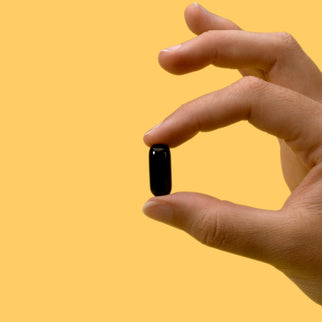Your eyes are an important part of how you experience the world, so providing them with the support they need to function properly is vital. Unfortunately, eye-related issues are not uncommon, especially as we age, making it more important to understand the best ways to care for them.
We should always start with a healthy, balanced diet when we strive to take care of any aspect of our health. However, it is not always easy to ensure you get all the vitamins you should to maintain your health.
Fortunately, many vitamins and nutrients can provide that extra support and peace of mind. At iwi life, we recognize how important it is to care for your vision, which is why we are here to highlight some of the best vitamins for your eye health.
What Are the Best Vitamins for Eye Health?
If you have ever asked about how to support your vision, you have probably been told to “eat your carrots,” as these orange vegetables are most commonly associated with eye health. However, they are not the only way to support your eye function.
The reality is that you should strive to obtain a range of vitamins and nutrients to best maintain your eye health. When exploring your options for eye supplements or multivitamins, you should look for the following.
1. Vitamin A and Beta-Carotene

Vitamin A is a very important part of your eye health, supporting several key functions. This vitamin supports our ability to see the full spectrum of light and supports cornea function. The vitamin may also support tear production, which helps lubricate the eyes.
Good sources include orange foods like carrots, pumpkin, and sweet potatoes. These foods all contain beta-carotene, a type of carotenoid that gives these foods their orange pigment.
Beta-carotene is converted to vitamin A by the body and generally provides about half of our vitamin A intake. If you are looking for a supplement to support your eye health, you may find vitamin A supplements and beta-carotene supplements separately. Since beta-carotene is a precursor to vitamin A, either option is good for supporting your eye health.
2. Vitamin C
Vitamin C is a water-soluble vitamin with a range of benefits to support your health, including the health of your eye. Although it is most often associated with immune health, vitamin C is just as important for its role as a powerful antioxidant that supports cell health in the body.
Vitamin C is also crucial for supporting the proper production of collagen in the body, a protein that makes up skin, muscles, and bones. In the eye, collagen is a key component of the sclera and the cornea, which make up the outer coating of the eyeball, protecting it from injury.
There are many excellent sources of vitamin C, including citrus fruits, peppers, and green vegetables.
3. Vitamin E

Similar to vitamin C, vitamin E is a helpful antioxidant that can help support your wellness. Unlike vitamin C, however, vitamin E is a fat-soluble vitamin. As a result, vitamin E may be more effective in supporting the integrity of fats like cell membranes. This is highly important since your eye is made up of a high concentration of important fatty acids.
It is helpful to obtain a combination of antioxidants like vitamins C and E through your diet, as the antioxidants in vitamin E, called tocopherols, can lose their antioxidant ability when supporting your cell health. However, vitamin C and other antioxidants can help restore the antioxidant capability of the form of tocopherol found in the body.
Sources of vitamin E include vegetable oils, nuts, and legumes.
4. Copper
Copper is an essential trace mineral in the body, helping to support the development of red blood cells and maintain healthy nerve function. These two functions are just as important for your eyes as for any other body part. Red blood cells help transport oxygen and nutrients, which are vital to the health of your eye.
At the same time, healthy nerve function is critical for your eye. After all, the optic nerve is one of the most important components of the eye, sending information from the retina to your brain, allowing you to see. In helping to support healthy nerve function throughout the body, a regular intake of copper can help support your vision as well.
In combination with zinc, healthy levels of copper also help support your retina health. Copper deficiency may lead to an imbalance of trace minerals like iron, zinc, and selenium in the eye.
Dietary sources of copper include oysters, whole grains, legumes, nuts, and potatoes. Copper gluconate is a common form of the mineral in supplements as it provides a bioavailable form of the nutrient that your body can use.
5. Zinc
Like the other nutrients on this list, zinc is essential for the metabolism of the eye and retina. Zinc also plays an important part in constructing proteins and cell membranes. As a result, low zinc levels can make these membranes more vulnerable to oxidative damage and reduced function. The mineral has antioxidant properties and contributes to cell signaling, making it even more important for eye health.
Zinc can be found in dietary sources like poultry, seafood, beans, and nuts.
6. Lutein and Zeaxanthin

Lutein and zeaxanthin are both powerful carotenoids that have several positive effects on your eye health. These two carotenoids have similar functions, and they are both thought to act as light filters that protect the eye tissues from harmful sun rays.
In nature, these carotenoids are found in the light-exposed parts of plants, providing protection against the sun. They have a similar role in the eye and are found predominantly in the macula in the retina. These carotenoids help absorb between 40% and 90% of blue light, which helps protect the retina from damage. They may even play an important role in the development of the eye during pregnancy.
Lutein and zeaxanthin are both strong antioxidants, like many other carotenoids. As a result, they may help support the body during exposure to irritants and stressors.
Natural sources of lutein and zeaxanthin include leafy green vegetables, egg yolks, and a variety of fruits and vegetables. However, supplements that include these two carotenoids are becoming increasingly common and easier to find.
7. Omega-3 Fatty Acids
Omega-3s are a type of polyunsaturated fatty acids that make up an important part of cell membranes and provide your body with energy.
These nutrients are important for your eye health for a list of reasons, but partly because they actually make up a part of your eye. Docosahexaenoic acid (DHA) is one of the most important compounds in the tissue of your eye and retina. DHA is an essential nutrient during pregnancy, as it is crucial for eye development.
Omega-3 fatty acids support not just the physical construction of your eye but also your vision, as they can help maintain the proper function of the photoreceptors in your eye. The fatty acids can also support the development of blood vessels in your eye that are vital to oxygen and nutrient supply.
The most popular source of omega-3 fatty acids is fatty, oily fish, like salmon, mackerel, and sardines. Many people choose to obtain their daily omega-3 intake from supplements like krill or fish oil. However, these options are not accessible to everyone due to seafood allergies, dietary restrictions, or a general distaste for fish.
Algae-based omega-3 supplements provide an excellent alternative, as they provide a stronger, plant-based source of these fatty acids without any fishy taste. Algae is even more beneficial as it is absorbed 1.7X better by the body than other sources of omega-3.
Get Ahead of Your Eye Health
Being proactive about your health is never a bad idea, and eye care is no different. Taking the right vitamins and nutrients is a great way to support your eye health and maintain healthy vision. If you are experiencing specific problems with your eyes, you should make sure to discuss them with your optometrist or healthcare provider.
If you want to give your eyes general support, then being mindful of your nutrition is an excellent way to do so. At iwi life, it is our goal to support your health as much as we can. With our specially formulated eye supplement, we provide key nutrients to support healthy eyes, including DHA omega-3, copper, and lutein. Try our Eye supplement for yourself and be proactive about your eye health.
Sources:
What Is Vitamin A Deficiency? | American Academy of Ophthalmology
Collagen Corneal Shields | Chicago Medicine
The Effect of Lutein on Eye and Extra-Eye Health - PMC



















